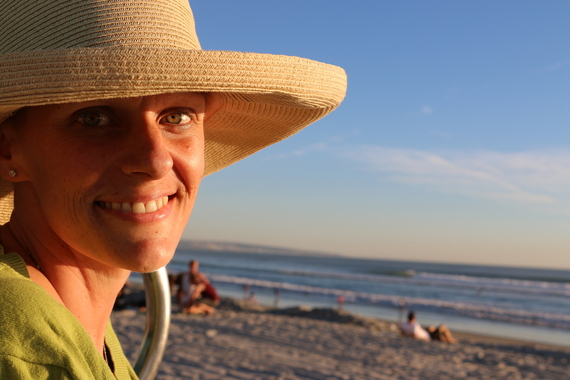Kara Tippetts, a wife and young mother, died recently. I didn’t know her. Like many, though, I feel as if I did–from the words she shared in her book, on her blog and in her radio interviews.
Tippetts, 38, was a warrior. She lost a battle with breast cancer, but she claimed victory in a larger war, one on fear. She dared to suggest breast cancer could be a “great story,” one that smacked of grace, and a chance to love and live better.
“I can say that cancer and suffering give the beautiful gift of perspective,” Tippetts wrote in her book, The Hardest Peace: Expecting Grace in the Midst of Life’s Hard.
“It is the gift you never wanted, the gift wrapped in confusion and brokenness and heartbreak. It’s the gift that strips all your other ideas of living from you completely. The beautiful, ugly raising to the surface of the importance of each and every moment.”
Kara Tippetts passed away March 22, 2015. She was 38. Photo courtesy of MundaneFaithfulness.com
She flew in the face of fears I’ve harbored since watching my mom die from breast cancer almost 26 years ago: fear of dying young, fear of being defined by cancer, fear of leaving children and a husband behind. Tippetts didn’t succumb to them.
She did lament passing on before seeing her children become adults. Yet she believed their lives would be richer for watching her live and die well.
Impossible to Ignore
I heard about Tippetts last fall, from a friend. At first I gave her story half a glance. In the middle of a stream of biopsies and tests to determine whether I had breast cancer, I didn’t want reminders of how it could plunder my life and cast my children into the motherless wilds I’ve known.
Tippetts’ story was as dreadful as it was radiant. I couldn’t ignore it. I bought her book and checked her blog at least once a week. In unvarnished splendor, her words have brought me comfort. Her faith and resolve have reminded me of my mom. In the shadows of suffering, both women found joy and lavished it on others. To read Kara Tippetts is to bask in the gift of that joy and hopefully, to share it.
When Tippetts passed away, she garnered media attention, sometimes referred to asthe woman who tried to dissuade Brittany Maynard from assisted suicide.
But she was far more.
Instead of turning her sour, trouble revealed her strength. In waning health, Tippetts began using a wheelchair. “You can imagine I don’t love having a wheelchair. In some ways, it admits defeat. I’m learning a new corner of my own vanity,” she wrote on her blog. Yet she looked for a way to soften the experience, and asked readers for ideas about what to name the wheelchair:
“Norman is my new ride. Yesterday I asked for name suggestions, and so many delightful names came through. Then I tried to think of a name that would help me not hate having a wheelchair. I then pictured a kind-faced, strong and weathered old grandpa that wanted to carry me for a bit. A sweet old man that said, ‘tired one, let me carry you for a bit, you look like you could benefit from my strength.'”
Freedom Found
During a recent show, Chris Fabry reflected on Tippetts’ passing, and aired clips from an earlier interview he had with her. Below are some points he covered, along with my own thoughts:
Beauty exists in the middle of tragedy. A child gets cancer. A friend commits suicide. A parent is plagued by anxiety and depression. Sooner or later, such messes find us. If we wade into them with an exploring mindset, our discoveries can be startling in their beauty and alter our perspective on life.
In the thick of her cancer fight, Tippetts authored a book and a blog, mothered four children and planted a church with her husband. Her story reached far more people than if she’d never been diagnosed with the illness. She encouraged, challenged, and offered a new view of hope and courage.
Our stories, no matter how difficult, can be used for good. Whether it’s cancer, depression or a difficult upbringing, sharing our trials with others can be a healing balm.
After the birth of my first child, I faced postpartum depression. What was supposed to be one of the best times in my life devolved into one of the worst. Sharing my story helped me heal and stirred my desire to help other women, on a larger scale. That’s taken shape in a book I’m writing.
Don’t resist suffering. Tippetts spoke of the challenge of releasing control over her life. Illness has a funny way of reminding us that control isn’t ours to keep.
After a few suspicious mammograms and biopsies last year, I wrestled with the idea of releasing control of my life. I relived the summer when my mom died, envisioning myself like her: swollen, unable to eat or sleep, pumped up on painkillers that turn a sharp mind into a muddle. I was afraid. When I focused on losing control, my fears grew.
Clinging to the illusion of control fuels my fear. What happens when I stop clinging? By Tippetts’ example, I see an opportunity for freedom–to stop striving, to live in grace, hope and enduring love, and to extend these to the people around me. This is true if I get cancer and fade at an early age, or if I live to 100.
Disease ravaged Tippetts, as it did my mom, and suffering lined too many of their days. Instead of letting cancer dominate them, both women maintained a healthy outlook and a conquering spirit. They released the stress of trying to stay in control, and sought to revel in the day at hand. Along the way, they found joy and freedom.
*This piece originally appeared on my Huffington Post blog.

Leave a Reply